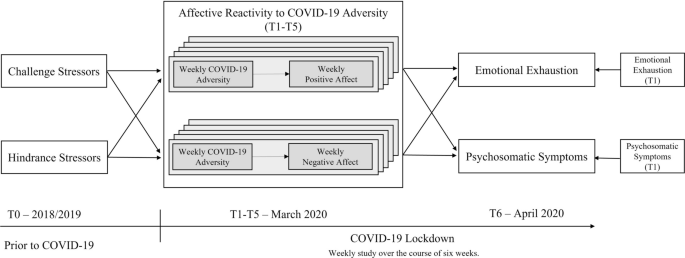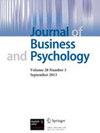面对当前逆境,过去的工作压力源如何影响心理健康:逆境的情感反应是一种解释机制
IF 4.9
2区 心理学
Q2 BUSINESS
引用次数: 0
摘要
本研究促进了对过去的挑战和障碍压力源与弹性结果之间的联系机制的理解,正如面对当前逆境时的情绪和心身应变所表明的那样。在资源保护理论的基础上,将其应用于挑战-障碍框架,我们认为过去经历的挑战和障碍压力源与当前逆境的不同情感反应模式有关,而这种模式反过来又预测了弹性结果。为了验证这些假设,我们收集了134名员工的数据,他们在2018年4月至2019年11月(T0)期间提供了有关工作压力源的信息。在第一次COVID-19封锁期间(2020年3月/ 4月),这些人参加了为期6周(T1-T6)的每周研究。为了检验我们的假设,我们结合了大流行前和大流行期间的数据。首先,我们进行了多水平随机斜率分析,并提取了个体斜率,表明在积极和消极影响下对COVID-19逆境的情感反应。接下来,通径分析结果显示,过去的挑战压力源与积极影响中对COVID-19逆境的较低情感反应相关,反过来又与较低水平的情绪和心身压力相关。过去的障碍压力源与对COVID-19逆境的积极和消极影响的更大情感反应相关,进而与更高的压力相关。综上所述,我们的研究概述了过去的工作压力源可能会对员工面对当前非工作逆境的反应性和弹性结果产生不同的影响。这些溢出效应突出了工作压力源在塑造员工跨环境和领域的弹性方面的核心作用。本文章由计算机程序翻译,如有差异,请以英文原文为准。

How Past Work Stressors Influence Psychological Well-Being in the Face of Current Adversity: Affective Reactivity to Adversity as an Explanatory Mechanism
Abstract This study advances the understanding of the mechanisms that link past challenge and hindrance stressors to resilience outcomes, as indicated by emotional and psychosomatic strain in the face of current adversity. Building on the propositions of Conservation of Resources Theory and applying them to the challenge-hindrance framework, we argue that challenge and hindrance stressors experienced in the past relate to different patterns of affective reactivity to current adversity, which in turn predict resilience outcomes. To test these assumptions, we collected data from 134 employees who provided information on work stressors between April 2018 and November 2019 (T0). During the first COVID-19 lockdown (March/April 2020), the same individuals participated in a weekly study over the course of 6 weeks (T1–T6). To test our assumptions, we combined the pre- and peri-pandemic data. We first conducted multilevel random slope analyses and extracted individual slopes indicating affective reactivity to COVID-19 adversity in positive and negative affect. Next, results of path analyses showed that past challenge stressors were associated with lower affective reactivity to COVID-19 adversity in positive affect, and in turn with lower levels of emotional and psychosomatic strain. Past hindrance stressors were associated with greater affective reactivity to COVID-19 adversity in positive and negative affect, and in turn to higher strain. Taken together, our study outlines that past work stressors may differentially affect employees’ reactivity and resilient outcomes in the face of current nonwork adversity. These spillover effects highlight the central role of work stressors in shaping employee resilience across contexts and domains.
求助全文
通过发布文献求助,成功后即可免费获取论文全文。
去求助
来源期刊

Journal of Business and Psychology
Multiple-
CiteScore
8.80
自引率
4.20%
发文量
70
期刊介绍:
The Journal of Business and Psychology (JBP) is an international outlet publishing high quality research designed to advance organizational science and practice. Since its inception in 1986, the journal has published impactful scholarship in Industrial/Organizational Psychology, Organizational Behavior, Human Resources Management, Work Psychology, Occupational Psychology, and Vocational Psychology.
Typical subject matters include
Team processes and effectiveness
Customer service and satisfaction
Employee recruitment, selection, and promotion
Employee engagement and withdrawal
Organizational culture and climate
Training, development and coaching
Mentoring and socialization
Performance management, appraisal and feedback
Workplace diversity
Leadership
Workplace health, stress, and safety
Employee attitudes and satisfaction
Careers and retirement
Organizational communication
Technology and work
Employee motivation and job design
Organizational change and development
Employee citizenship and deviance
Organizational effectiveness
Work-nonwork/work-family
Rigorous quantitative, qualitative, field-based, and lab-based empirical studies are welcome. Interdisciplinary scholarship is valued and encouraged. Submitted manuscripts should be well-grounded conceptually and make meaningful contributions to scientific understandingsand/or the advancement of science-based practice.
The Journal of Business and Psychology is
- A high quality/impactful outlet for organizational science research
- A journal dedicated to bridging the science/practice divide
- A journal striving to create interdisciplinary connections
For details on submitting manuscripts, please read the author guidelines found in the far right menu.
 求助内容:
求助内容: 应助结果提醒方式:
应助结果提醒方式:


